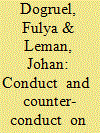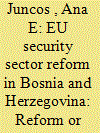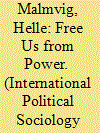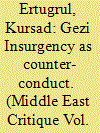| Srl | Item |
| 1 |
ID:
090404


|
|
|
|
|
| Publication |
2009.
|
| Summary/Abstract |
Due to its particular border situation and historical past, Antakya (in south-central Turkey) has, in contrast to most cities in Turkey, been successful in protecting important components of its diachronically composed multiculturalism. In light of such qualities Antakya is able to permit a diachronic analysis of different subsequent 'governmentalities' (Foucault) and flexible network formations that reflect the various processes in government styles in twentieth century Turkey. Through participant observation and in-depth interviews the authors try to reconstruct the diachronic multiculturalism from a perspective of macro- and micro-powers, 'conduct' and 'counter-conduct'.
|
|
|
|
|
|
|
|
|
|
|
|
|
|
|
|
| 2 |
ID:
157981


|
|
|
|
|
| Summary/Abstract |
Attempts to explain the failure to reform the security sectors in post-conflict countries have often resorted to two sets of explanatory factors: international and local factors. This article seeks to move from that unhelpful dichotomy to an explanation linking both factors. Drawing on a Foucauldian approach and the concept of “counter-conduct,” it examines the rationality and practices of European Union (EU) governmentality and how governing technologies are resisted and reversed by local elites involved in security sector reform (SSR). Instead of understanding power and resistance as binary opposites, this article argues that counter-conduct can be conceived as implicated in the very relations of power that it seeks to resist. To tease out these relations, the article analyzes the EU's efforts in SSR in Bosnia and Herzegovina, where it identifies four forms of counter-conduct: upholding European standards, using the local ownership trap, simulating reforms, and lowering the bar.
|
|
|
|
|
|
|
|
|
|
|
|
|
|
|
|
| 3 |
ID:
134380


|
|
|
|
|
| Summary/Abstract |
For over a decade, Arab governments have been enrolled into EU initiatives aimed at promoting democratic reform in the region. Common to these initiatives are their claims to be uninvolved with power and external imposition, professing instead to be based on voluntary notions of local demand and ownership. This article challenges this core liberalist assumption of the absence of power. Drawing on Foucault's reflections on liberal governmentality, it shows how power operates through a technology of “contractualization” which produces a distinct Arab subjectivity in the form of a lack (of reform will). Yet governing technologies are never complete, and possibilities of reversal and resistance always exist. In the second part, the article engages with the emerging debate on Foucault's concept of counter-conduct, opening up the concept to more subtle and less spectacular forms of resistance. Drawing inspiration from Derrida's analysis of (in)hospitality and Baudrillard's logic of simulation, the article shows how the liberal assumptions of “invitation,” “ownership,” and “gradualism” inherent in European reform initiatives enable resistance in the form of: (i) selection of entry; (ii) setting conditions; and (iii) simulating reform.
|
|
|
|
|
|
|
|
|
|
|
|
|
|
|
|
| 4 |
ID:
186932


|
|
|
|
|
| Summary/Abstract |
This article defines the Gezi insurgency as a case of ‘counter-conduct’ with a heterotopia in a Foucauldian sense and compares it with similar movements to underline its peculiarity. It argues that Gezi cannot be defined as an ‘anti-austerity’ or ‘anti-dictatorship’ movement. Rather, it was a struggle against the neoliberal-cum-neoconservative conduct under AKP rule and its leadership taking the form of a pseudo-presidential regime. Gezi not only was a search for a different conduct but also a possible self-conduct through self-invention in prefigurative experimentations with different ways of being and practicing direct democracy in the reclaimed public spaces that characterized the action process. What sustained this counter-action process was the spontaneous constitution or deployment of certain platforms like Blok and Çarşı which did not, in themselves, express or represent any given social or political organization nor a corresponding form of a generic identity. In the Gezi insurgency, actors tended to outflow their defining social categories and become a part of the series of performances in which a sense of self-transformation has been common.
|
|
|
|
|
|
|
|
|
|
|
|
|
|
|
|